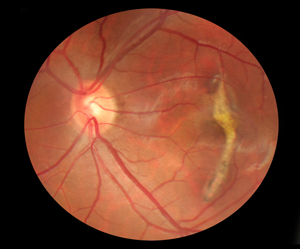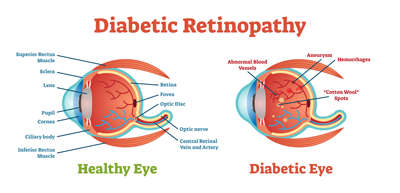Locations
Clinical Trials
Publications
Eye Conditions
Eye Procedures
Contact Dr. Velez
Patient Portal
New Patient Forms
Clinical Trials Enrolling:
Protocol AC (Phase III study sponsored by NEI’s DRCR Network) on Diabetic Macular Edema (DME)
Aflibercept versus Bevacizumab with deferred Aflibercept for DME
This study is being done to compare the effectiveness of a medication called Eylea to the medication Avastin in eyes with swelling in the center of the retina. This condition is called Diabetic Macular Edema or DME. The purpose of this study is to find out if starting with Eylea has better results than starting with the less expensive drug, Avastin, and only switching to Eylea if needed.
 MAIN CRITERIA
MAIN CRITERIA
- You must have 20/50 vision or worse
- You must have a certain kind of diabetic macular edema in at least one eye that meets certain criteria
- You must not have had treatment for diabetic Macular Edema within four months before starting the study
- You must not have history of any treatment to stop vessels on the retina from leaking (Pan Retinal Photocoagulation) within 4 months before starting the study or no anticipated need for the treatment six months after starting the study
- You must not be on dialysis or have had a kidney transplant
[ClinicalTrials.gov identifier NCT03321513]
Protocol AD (Phase III study sponsored by NEI’s DRCR Network and Kowa Research Institute) on Diabetic Retinopathy (DR)
PROMINENT-Eye Ancillary Study: Diabetic Retinopathy Outcomes in a Randomized Trial of Pemafibrate versus Placebo.
This study is being done to see if a medication called pemafibrate can help diabetic retinopathy. Diabetic retinopathy occurs when there is damage to the blood vessels on the surface of the retina, the back part of the eye, due to high blood sugar. In order to go into this study, you must be in the main PROMINENT study. That study is trying to find out if this same medication can reduce the development of heart and other blood vessels problems.
MAIN CRITERIA- You must already be in the main PROMINENT study
- You must have diabetic retinopathy of a certain amount in at least one eye
[ClinicalTrials.gov identifier NCT03345901]
Anterior Uveitis Study (Phase III sponsored by Aldeyra Therapeutics, Inc)
A Phase 3 Randomized, Double-Masked, Vehicle-Controlled Trial to Evaluate the Safety and Efficacy of ADX-102 Ophthalmic Solution in Subjects with Non-infectious Anterior Uveitis
This randomized study evaluates the safety and efficacy of ADX-102 ophthalmic solution in Subjects with non-infectious anterior-uveitis (NAU). The trial is expected to enroll up to 100 patients, randomized equally to topical ocular ADX-102 or vehicle treatment for four weeks. Consistent with other NAU clinical trials, the primary endpoint is the clearing of inflammatory cells in the anterior chamber of the eye.
MAJOR CRITERIA- 18 years of age or older
- Subjects with acute non-infectious anterior uveitis with onset of symptoms within the previous 2 weeks.
- Best corrected visual acuity (BCVA) better than or equal to 35 letters in the study eye and 65 letters in the non-study eye using ETDRS testing.
- NO Severe/serious ocular pathology in the study eye(s)
- NO Active intermediate or posterior uveitis in the study eye(s).
- NO Previous anterior uveitis episode in the study eye less than or equal to 4 weeks prior to screening
[ClinicalTrials.gov identifier NCT03131154]
Clinical Trials Open But Not Enrolling:
Protocol AB (Multi-center randomized clinical trial sponsored by NEI’s DRCR Network) on Vitreous Hemorrhage from Proliferative Diabetic Retinopathy (PDR)
Intravitreous Anti-VEGF vs. Prompt Vitrectomy for Vitreous Hemorrhage (VH) from PDR
The objectives of this study are to 1) evaluate and compare visual acuity outcomes over 2 years of a prompt vitrectomy + panretinal photocoagulation (PRP) regimen and an intravitreous aflibercept regimen in eyes with VH from PDR for which intervention is deemed necessary, and 2) characterize the follow-up course for the two treatment regimens, including but not limited to post-operative complications for the vitrectomy group, and number of injections needed and percent requiring vitrectomy in the intravitreous aflibercept group.
MAJOR CRITERIA- Immediate vitrectomy not required (investigator and participant are willing to wait at least 4 months)
- Visual acuity letter score less than or equal to 78 (approximate Snellen equivalent 20/32)
- No Systemic anti-vascular endothelial growth factor or pro-vascular endothelial growth factor treatment within 4 months prior to randomization
- No retinal detachment
- No diabetic macular edema
- No History of vitrectomy
[ClinicalTrials.gov identifier NCT02858076]
Protocol W (Phase III study sponsored by NEI's DRCR Network) on Diabetic Retinopathy (DR)
Intravitreous Anti-VEGF Treatment for Prevention of Vision Threatening Diabetic Retinopathy in Eyes at High Risk
This randomized study tests if intravitreous Anti-VEGF aflibercept (Eylea) given to diabetic patients before progression to retinal neovascularization or proliferative diabetic retinopathy (PDR) decreases the risk of DR worsening. Subjects will be randomized to taking either taking aflibercept (Eylea) or standard of care (sham injections). If this study demonstrates that intravitreous aflibercept treatment is effective and safe for reducing the onset of PDR or center involved- DME (CI-DME) in eyes that are at high risk for these complications, a new strategy to prevent vision threatening complications of diabetes will be available for patients. The application of intravitreous aflibercept earlier in the course of disease (i.e., at the time when an eye has baseline severe non-proliferative diabetic retinopathy) could help to reduce future potential treatment burden in patients, at the same time resulting in similar or better long-term visual outcomes, if PDR and DME are prevented.
 MAJOR CRITERIA
MAJOR CRITERIA
- Severe NPDR (ETDRS level 53) according to investigator 4-2-1 rule
- Severe hemorrhages in at least 4 quadrants, or
- Definite venous beading in at least 2 quadrants, or
- Moderate IRMA in at least 1 quadrant
- Vision 20/25 or better
- No center-involved DME on OCT
- No history of DME/DR treatment in prior 12 months and <4 prior injections at any time
- No prior PRP
[ClinicalTrials.gov identifier NCT02634333]
Clinical Trials Completed:
PEACHTREE protocol CLS1001-301 (Phase III study sponsored by Clearside Biomedical)
Non-infectious uveitis trial
This randomized study evaluates the safety and efficacy of suprachoroidally administered triamcinolone acetonide, CLS-TA, in subjects with macular edema associated with non-infectious uveitis. The Primary Outcome Measure is the improvement of Visual Acuity in the study eye.
[ClinicalTrials.gov identifier NCT02595398]
CEDAR protocol 150998-005 (Phase III study sponsored by Allergan) on wet AMD<
Safety and Efficacy of Abicipar Pegol (AGN-150998) in Patients with Neovascular Age-related Macular Degeneration
This randomized study tests the investigational product, abicipar, administered at baseline (day 1), weeks 4 and 8, followed by doses at 8-week or 12-week intervals through week 96 compared with 0.5 mg ranibizumab (Lucentis) administered every 4 weeks through week 100. The Primary Outcome Measure is the improvement of Visual Acuity in the study eye. This investigational medication may reduce the frequency of intravitreous injections compared to monthly injections of ranibizumab.
[ClinicalTrials.gov identifier NCT02462928]
ORBIT protocol TG-MV-018 (Phase IV study sponsored by ThromboGenics, Inc.) on VMA
Ocriplasmin Research to Better Inform Treatment (ORBIT)
This is an observational study to record clinical outcomes and safety in patients receiving JETREA® for the treatment of symptomatic vitreomacular adhesion (VMA) as per standard of care in US retina clinics.
[ClinicalTrials.gov identifier NCT02079883]
SARIL-NIU-SATURN protocol ACT13480 (Phase III study sponsored by Sanofi) on Posterior Uveitis
A randomized, double-masked and placebo-controlled study to evaluate the
efficacy and safety of sarilumab administered subcutaneously every 2 weeks in
patients with Non-infectious, Intermediate, Posterior or Pan-Uveitis (NIU)
Sarilumab (SAR153191)
This is a randomized study where the primary objective is to evaluate the efficacy of 200 mg sarilumab q2w at W16 in patients with NIU. The goal of NIU treatment is to control inflammation, prevent visual loss and minimize progression.
[ClinicalTrials.gov Identifier NCT01900431]
NS2-02 (Phase II study sponsor Aldeyra Therapeutics, Inc.) on Anterior Uveitis
A Phase 2 Randomized, Investigator-Masked, Comparator-controlled Trial to Evaluate the Safety and Efficacy of NS2 Eye Drops in Patients with Anterior Uveitis
The investigational medication, NS2, a small molecule aldehyde trap, may decrease inflammation by lowering aldehyde levels. Free aldehydes are thought to be related to inflammatory diseases such as uveitis. NS2 is a non-steroidal which does not carry the same risks of prolonged corticosteroid use. The purpose of this study is to determine whether NS2 is safe and effective in the treatment of uveitis compared to the FDA approved steroid eye drop, Pred Forte®.

